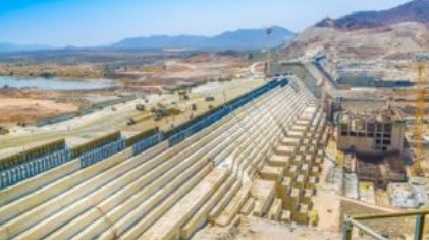
26 Mar 2023; MEMO: Ethiopian Vice-Chair of the Renaissance Dam Coordinating Council Faqrati Tamru announced on Friday that 90 per cent of the construction of the Renaissance Dam had been completed. Meanwhile, Egypt's Minister of Water Resources and Irrigation Dr Hani Sewilam indicated that the continued uncooperative unilateral measures to operate the Grand Ethiopian Renaissance Dam could harm his country and cause immeasurable damage to the social and economic stability of Egypt.
Tamru shared, according to Al Jazeera, that the dam faced challenges, diplomatic pressures and an internal war. The Renaissance Dam Project Coordination Council also announced a celebration on Saturday, marking the 12th anniversary of laying the foundation stone for the dam. This announcement came hours after Egypt warned of the economic, social and environmental dangers of unilateral moves on common river basins.
Dr Sewilam also stressed Egypt's commitment to joint cooperation that serves the interests of all parties through discussions to ensure fair use and avoid serious harm. This came on the sidelines of Dr Sewilam's participation in the Interactive Dialogue: Water and Cooperation session as part of the United Nations (UN)'s Mid-Term Comprehensive Review conference in New York. He stressed that effective cooperation in managing shared water resources is crucial, especially since nearly 40 per cent of the world's population lives in common river and lake basins.
The minister of irrigation added that Egypt relies almost exclusively on the shared water of the Nile River and always seeks to enhance cooperation and coordination between the various countries of the Nile Basin. He noted the unilateral and non-cooperative measures that ignore compliance with international law and the selective application of it.
The Egyptian minister of irrigation also criticised the disregard for the basic principle of cooperation, which includes discussion and conducting studies of the social, economic and environmental impact on the planned measures, constituting a major challenge to cooperation in managing shared water. This is evidenced by the Ethiopian Renaissance Dam, which began construction unilaterally 12 years ago without carrying out the required social, economic and environmental impact studies.
The minister explained that the filling and operation of the Renaissance Dam continues despite the absence of these studies or the existence of a legally binding agreement governing filling and operation, which completely disregards the presidential statement issued by the UN Security Council in 2021.
He added that continuing such unilateral, non-cooperative measures could harm Egypt, although it is often claimed that hydroelectric projects should cause no harm. If these unilateral measures coincide with a prolonged drought, it could cause immeasurable damage to the social and economic stability in Egypt, forcing more than 1.10 million people to leave their jobs and destroying a large part of the cultivated land in Egypt.
In a parallel context, on Thursday, Ethiopia accused Egypt of "violating" the UN Charter and the Constitutive Act of the African Union in response to statements made by Egypt's Foreign Minister Sameh Shoukry regarding the Grand Ethiopian Renaissance Dam.
Addis Ababa condemned Shoukry's statements, in which he stated: "All options are open, and all alternatives remain available. Egypt has its capabilities, foreign relations and resources." Shoukry's statements came when Ethiopia was preparing for the fourth filling of the dam's reservoir without reaching an agreement with the downstream countries, Egypt and Sudan.




